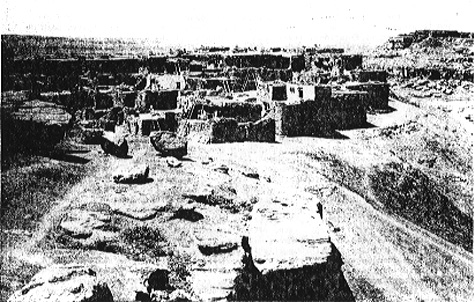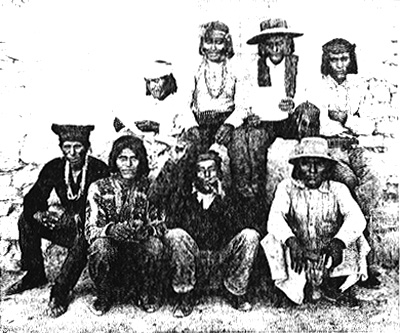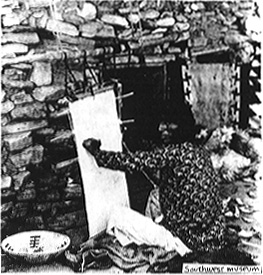

Issue Number 18
Hopi Traditional Village presents their case in Holland's Tribunal
With much regret we delayed this issue, our apologies to our readers. Sometimes one must make a decision between two vital objectives. We decided to bypass our newsletter for a time and respond to an invitation from Holland's Fourth Russell Tribunal in order to present our case before the international jury.
We prepared two cases, the general problem in Hopi land and a special document in reference to Hotevilla Traditional Village. We did this because of the different philosophic concepts and self-governing bodies of each village. We took this step because we feel and trust that they have similar purposes and goals to reach. We hope this move will not hinder the traditional concepts and efforts to resist the oncoming encroachment into our land.
At this time we are aware there are many people who are curious and anxious to know the outcome. If we shall succeed or fail. This we cannot predict or be boastful about, for it is like a seed put into the earth, whether it will bring forth a good harvest or whether we will face famine. We must be patient, for now all we can say from our viewpoint is that the gathering created deep strong feelings. We hope that it will bring a good harvest.
To our understanding the purpose and aim of the Tribunal is that it is a foundation, consisting of non-government organizations of different nations focusing on the rights of the native people of South and North America: To further the observance of human rights, the rights of the Indians to have their own tradition, language, culture, and territory, without interference from outside sources. That the governments of the countries and the tribal governments within, (as well as any opposition) must respect their own constitutions and cease their violations of human rights and the autonomy of all the indigenous people so they will be free to seek their own self-determination. That colonization, exploitation and extermination must stop before all the aboriginal natives, the guardians of land and life, disappear from the face of the earth.
Upon these bases, the Tribunal's effort is toward mobilizing public opinion and to arouse a consciousness of the Native problems by means of publicity, both on a national and international level. The documents will be made available to or will be sent to the world's governments, institutions of higher learning, and others including those accused. The effort is to awaken and increase the pressure of public opinion, to make the problems known on a larger scale in order that they may be called to the attention of the various political and authoritative organizations.
The Tribunal was well attended by representatives from different countries. One can feel the atmosphere of sacredness and honor among people with the same problems and the supporters who care and are dedicated to the Almighty, the Great Creator.
For several days after our case was presented before the international jury key questions were asked of witnesses and experts for confirmation before the jury. Oppressed minorities of many countries have their cases heard. All cases had these factors in common: oppression, exploitation, extermination, genocide, etc. The accused or representative government institutions were also invited to be present in order to have a chance to present a clear understanding to the jury and the people in defense so that everything can be brought out into the open. Sadly, none appeared to challenge the charges brought by the Native peoples. We will bring out more information in our next issue, the outcome and the resolution.
We have a hard struggle ahead, the opposition is very strong and has no mercy. For over half a century the official Federal policy has been to assimilate the Indians by every available means. First, to attempt to outlaw the tribal religion and replace it with Christianity as the official religion. Then compulsory boarding schools were established for indoctrination without much success so the Federal policy toward Indians changed to fostering the Indians through economic development, modern conveniences, health care, religious freedom, cultural autonomy, tribal self-government by election through denouncing the village leadership as a governing body.
In their folly some took the bait claiming this was payment by the Government for making use of our land and resources. It makes sense in some ways, but to set an example Hotevilla Village has, over the years, refused to be lured, maintaining their stand.
Research by scholars finds and regards Hotevilla Village as a special administrative problem because of their past. There are constant reminders of force and tension built up by persistent pressure by the Government which has caused them to cast themselves into an unyielding mold. They maintain that they have committed no crime, only to live in their own ways. This is true, but equally trues is it that Traditional leadership is based on moral, non-violent, religious beliefs with respect not only for their own people, but for all land and life, rather than based on prestige and the power to dominate. To stray from this code of laws would destroy the Hopi way. Therefore acculturation is not the solution for the problems in Hopi land.
We don't know what the future holds for us. As a byword, we will wait perhaps four days, four weeks, maybe four months, perhaps even four years. Whatever this seed produces, success or failure, our course must change.

Men of 1st mesa, the Deputies or Renegades who were ordered
by the Hopi Indian Agency to cause disturbances in Oraibi.
In our last two issues we took you on a journey through the Hopi world, before and after bahanna came into Hopi land. During the period when order within Hopi land was disrupted by western ideas as foretold. We led you through this journey in an effort to give you a clear understanding of what consequences the Hopi will face if we forget our ways and allow ourselves to be diverted into other life designs that are not ours. In fact, this is what has happened to the Hopi. Only a handful who have refused to accept the new ideas have suffered prompt consequences at the hands of our own people.
Now let us continue with your journey as a Hopi. You recall only months ago you walked the mesa top where your people live. It is a great feeling to do as you wish, unafraid, to play and dance with children of your own age.
You have grown up quickly during all the confusion. You begin to pick up the realities of life as your thoughts return to your elders and the knowledge of prophecies, the pattern of life set for you. You want to run away because of your fear but you also want to see it through like a brave Hopi. You realize your people are helpless too, you are all in the clutches of bahanna.
Many things have happened during your captivity, you have learned to accept the demands that come your way. One morning after early breakfast you and the other boys and girls are dressed in extra clothing, with blankets and sacks of food you are loaded on wagons. No one has told you where you are going but everyone is excited to be going on an adventure after being cooped up for several months.
All that day you travel without reaching your destination. It is cold with patches of snow on the ground. You huddle together to keep warm with what little covering you have. You and the other older boys run and walk beside the wagons to keep warm. You have the urge to run away, but you realize you could not escape the guards on horseback. Shortly before dark you are stopped to make camp. Cold, tired, and hungry, the older children are told to gather firewood. You are happy that you can do something to get warm and you feel pity for the younger children who are in tears. Finally you are fed and allowed to warm yourself near the fire. Sleeping is almost impossible in the cold but somehow you make it through the night and are ready to continue the journey the next day.
Late the second day you hear a shout and look off into the distance where you see smoke, your spirits rise, maybe you are nearly there. It takes another three hours to reach the place just before dark. As you ride through on the wagon you see that these are much bigger houses with many windows and lights. Many people are walking around who look like the first bahanna you saw.
Now you find yourself in a very strange place with roads of shining metal, upon these roads are strange monsters. Monsters who breathe through the top of their heads and have one glaring eye. monsters that howl like coyotes and hiss and grunt like giant snakes. These things were long and moved on wheels like wagons. You are told to get inside the belly of one of these monsters through a doorway and you do so reluctantly, trying to control your fear.
Once inside the monster you are surprised to find it is comfortable and warm with seats for you to sit on. The bahanna who is going with you is nice, she gives you and the other children sack lunches and some sweet drinks. After two hard days travel with little sleep soon everyone is in deep slumber.
The next day you awake to find yourself in a much larger place with taller houses than you have ever seen before and many more bahannas. You are taken to a place which will be your home for the next five or more years. There you are separated from the other children, bathed and given clean clothing, a bed and a schedule for all the things you are to do. From now on your life is a mixture of loneliness and happiness. You are always under watchful eyes. No longer can you dance and sing your own way. No longer can you see Katchina dances in the Kiva, no longer can you go exploring the mesa tops.
As time passes on you begin to adjust yourself to the new conditions by taking part in the activities. Soon you no longer think much about your country and people, the ceremonial dances or helping your father and grandfather in the corn fields begins to dim in your mind. You no longer speak your own language. During the five years or more in captivity your mind has slipped into bahanna concepts. You dream of the future with better and easier ways of living. Working the fields has no future, the bahanna ways seem much better. You can have electricity and water right in your own home. Why live the old ways, carrying jugs of water and wood to store in the barn on your back for the long distances you remember having to do as a child. Now that you have learned a trade and will be making a lot of money you plan to buy many good and beautiful things you have seen in the big stores. You even think about moving into town and owning your own home. That would certainly make you the envy of your people and your friends.
Unknown to you, about this time the crisis in your land has become critical causing much unrest and friction. Continually the children are taken away by force to schools by the Navajo and Hopi renegades under instructions from the agency. They act without mercy in dealing with your people causing much disturbance and distress. Because you have by now spent so much time with bahanna you would not understand why your people have made a firm stand to suffer for you and your future. You could not understand that bahanna and your corrupted leaders have planned deliberately to destroy the minds of all the children as Hopi. It has worked and you and the other children are the victims. In our next issue we will show you how the victimized children accept bahanna ideas and concepts and become traitors to their own people. Later one will discover that his people were right. Through his own experiences in exploring the inner cities and towns he realizes the false values of the bahanna and denounces the bahanna system to defend his own people.

COMMENTS ON AN ARTICLE WHICH APPEARED IN THE PUPPET PRESS
Apparently the puppet Hopi Tribal Council are to be a dominating government over the land. Once again a crunch to belittle and degrade the Traditional leadership structure. This notice may not sound good to both Traditional and progressive circles. The article is misleading.
NOTICE
"The Hopi Tribal Council has the responsibility to supervise all use of the Hopi partitioned lands. There are no recognized clan, village or individual holdings in Hopi partitioned lands. Permission for grazing, farming, homesteading and other uses must be obtained from the Hopi Tribal Council."
 The shield symbol with its four
The shield symbol with its fourcircles in four quadrants means:
"Together with all nations we
protect both land and life, and
hold the world in balance."







No comments:
Post a Comment